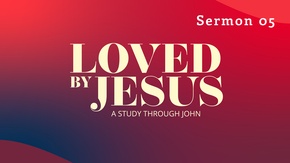It’s interesting that when God chose to reveal Himself most finally and fully, most clearly, most definitively, that He didn’t drop a “systematic theology” from heaven. He didn’t give us 194 core doctrines that we need to believe and memorize. “There will be a test.” No, that would be too abstract or impersonal. Nor did God launch a political campaign. Aren’t you glad? He didn’t have fundraisers and marketing to get the word out. No, that would be too self-promoting, too pushy. What God did is He sent us His Son, Jesus Christ, who is mostly unknown, kind of inconspicuous, incognito for much of His life, until one day that is, when John the Baptizer announced and identified Him with the words, “Behold, the Lamb of God who takes away the sin of the world.”
It piqued the interest of an initial group of people that we saw last week became followers of Jesus, people like Andrew and Peter and Philip and Nathanael, and one other disciple that we still don’t know the name of. And there was a refrain, if you remember, from last week. We saw this phrase over and over again, “Come and see.” “Come and see who this Jesus is. Come and see where He is staying. Come and see what He is up to. Come and see all that He has to offer to us.” And I’m amazed at this approach. This God, revealing Himself in Jesus is a rather subtle approach, isn’t it? “Come and see. Come close. Get up close and over time you will discover who I am.”
Of course, this is the same way we get to know people, isn’t it? We get together with them and spend time together. We have conversations. We do life with them. We share joys and sorrows, and ups and downs, and the ins and outs of life. And friends, this is the beauty of this moment that in Jesus, God is revealing Himself up close and in person. Jesus is slowly lifting the veil on who He is. We catch it one glimpse at a time as Jesus is disclosing Himself.
And so the invitation to “come and see” is not just for the disciples but it’s for you and for me that we would come and see Jesus as He begins to disclose who He is, one step, gradually, moment by moment. And as we receive Him, He will reveal more. And so today we are turning in the book of John to John 2:1–25, and we’re going to catch the first three recorded glimpses of Jesus in this Gospel. We’re going to see first the crisis, secondly the cleansing, and then thirdly, the confrontation. And in each one of these we’re going to catch a glimpse of the glory of Jesus. But before we open our Bibles would you bow your head? Let’s pray together.
Father, would you show us Jesus today? We have come to see Him. We gather to experience His life, to be surprised and mesmerized and changed as we gaze upon and trust in your Son from beyond the walls of the world. Help us see Jesus. We pray this in His beautiful name, Amen. Amen.
So the first thing we see here in this text is the crisis. In chapter 2, verse 1, this is what we read. “On the third day...” Just pause for a moment. This is the third day since the disciples have been following Jesus, so on day 1, this was when they followed Jesus home and they spent the evening with Him, you’ll remember. Day 2 was when they went up to Galilee, and that’s the whole interaction with Nathanael. And now we are on day three, and John tells us there was a wedding at Cana in Galilee. And the mother of Jesus was there. And Jesus also was invited to the wedding with His disciples.
“When the wine ran out, the mother of Jesus said to him, ‘They have no wine.’ And Jesus said to her, ‘Woman, what does this have to do with me? My hour has not yet come.’ His mother said to the servants, ‘Do whatever he tells you.’”
Now, Jesus is back in Galilee. He’s in Cana, just a few miles from His home town of Nazareth. He and His disciples are attending this wedding here. Now, first–century Jewish weddings were known to take days, maybe even up to a week. There were lots of celebrations, festivities, meals, that sort of thing, and there’s a scandal here in this particular wedding because the wine ran out. And this was not just “Oh no, they have nothing to drink.” This was a scandal. The bridegroom was responsible to calculate and provide the wine. This was his big task that he brought to the wedding. And he could even be sued by the bride’s family for failing to uphold his end of the deal here. So there’s huge shame in this shame-and-honor culture that’s about to fall on the bridegroom for failing to have enough wine.
Mary realizes the problem and she tries to get ahead of it here. She’s taking responsibility for the situation. She tells Jesus, “They have no wine.” Now, Jesus’ response here is a bit surprising. It is respectful, but it is a bit cold. He says, “Woman, what does this have to do with me? My hour is not yet come.”
Now I don’t really like the translation of the word here, woman, because there’s just no way to say that in English that doesn’t come across as disrespectful. This is not a disrespectful or demeaning term in the first century. It’s kind of like the word, “ma’am,” might be in the southern part of our country, or something like that, you know. “Ma’am, what’s going on here. This has nothing to do with me.” It is a bit of a detached term here. Now He’s distancing Himself from Mary and her request. He says, “What does this have to do with me? This is my problem, how?” His reasoning is, “My hour has not yet come.”
Now this is a very curious phrase, isn’t it? “My hour has not yet come.” Now if you’ve ever studied the Gospel of John you will know that Jesus’ hour is actually a very technical phrase. In the Gospel of John, it refers to the hour of Jesus’ glory as He is lifted up on the cross and draws all people to Himself. For example, in John 12:27–28 we read, “For this purpose (Jesus is speaking) I have come to this hour. Father, glorify your name.” So at one level, this phrase, “My hour has not yet come,” is meant to pique our curiosity. There is an hour of destiny, of glory that is coming for Jesus. When will it be? It’s not now, but when is it? We’re supposed to wait for that. This is the first occurrence of the phrase. But there’s actually no way that Mary could have understood all that Jesus means by this phrase, not this early in this ministry. How would she have heard this in its original setting? “My hour has not yet come.” Well, I think she would have heard it the same way we would hear it in this kind of a context. Listen, whose hour is this? It’s the bride and groom’s hour. This is their day. This is their celebration, their hour, their moment. And they’re the ones that don’t have any wine. And Jesus is saying, “Look, what does this have to do with me? This isn’t my big day. This is not my problem.” And Mary says to the servants, “Do whatever he tells you.” So she doesn’t let Him off the hook, like a good mom wouldn’t. Right?
Now, I don’t know what Mary expects Jesus to do here. He’s never done any miracles before so she can’t be expecting Him to do a miracle. But she knows His heart, and she knows how resourceful He is, and so she’s sort of saying, “Listen, He’ll come up with something.”
And look at what happens here in verse six: “Now there were six stone water jars there for the Jewish rites of purification, each holding twenty or thirty gallons.” And just pause for a second. Prior to the feast, the Jewish customs required that all dishes and utensils and hands would be ritually washed to be clean and kosher for these celebrations. And so these jars were used for that prior to the wedding, and here they are just standing. They’re still standing around.
Verse 7: “Jesus said to the servants, ‘Fill the jars with water.’ And they filled them up to the brim. And he said to them, ‘Now draw some out and take it to the master of the feast.’ So they took it. When the master of the feast tasted the water now become wine, and did not know where it came from (though the servants who had drawn the water knew), the master of the feast called the bridegroom and said to him, ‘Everyone serves the good wine first, and when people have drunk freely, then the poor wine. But you have kept the good wine until now.’”
Now I want you to notice three things here. Okay? First, notice how quiet this is kept. There are only a few people who know what’s going on here. They’re keeping it on the down-low. Why is that? Well, they’re trying to preserve the groom’s honor. He even gets the credit in the end. Right? “You saved the best for last.” He gets credit. In other words, they’re trying to preserve this, keep his shame for coming out into the open. We’re getting the behind-the-scenes view here. It’s kept quiet.
Secondly, it’s the quality, the quality of the wine that Jesus makes here. “Everyone,” he says, “serves the good stuff first and the cheap wine comes out later when everyone has drunk freely, and they won’t know the difference at that point. But you’ve flipped the script here, you know? This is the best stuff yet.”
Now, I don’t know a whole lot about wine, but I know you can get wine in a box, I know you can get wine with a cap on it, and I know you can get wine with a cork. Okay? And I hear that the cork is the good stuff. So this is the good stuff. That’s the point. This is the good stuff. Jesus brought out the best wine of the feast.
The third thing I want you to see is the quantity of the wine here. There are six jars for the purification rites, holding 20 to 30 gallons per jar. Right? And he fills them up to the brim, we are told, and it all turns to wine. This is the equivalent, listen, this is the equivalent of 640 to 960 bottles. (laughs) This is a lot of wine. This is between 4,800 and 7,200 servings of wine. So Mary says, “Look, they’re out of wine.” What’s she thinking? Go to the store and get a couple bottles, like maybe get a couple dozen bottles at the most, right? Jesus backs up a flatbed truck and starts crating off the wine here. There is sheer excess, overabundance of wine. This is amazing.
Verse 11: “This,” John says, “was the first of his signs, Jesus did at Cana in Galilee, and manifested his glory. And his disciples believed in him. After this he went down to Capernaum, with his mother and his brothers and his disciples, and they stayed there for a few days.” John says, “This is the first of His signs. The very first thing.” The word signs–he uses this all throughout his book. Instead of miracle, he uses the word sign. Why? Well, because signs point to something. Signs signify something, point to something beyond themselves. He wants us to look and meditate and consider what is the meaning of these signs. He says, “Jesus manifested His glory. His disciples believed in Him.”
Well, what glory did they see? What was the meaning of the sign? What prompted their belief? Well, friends, lavish wine signifies the eschaton. (chuckles) Lavish wine signifies the eschaton. The eschaton–the last days, the days of the Messiah, of the kingdom come, of the world set to rights. The prophecies of old, in the Old Testament, connected lavish wine with the days of eschatological hope where God would move on behalf of His people. Let me show you three passages quickly.
Jeremiah 31:12–14 says this: “They shall come and sing aloud on the height of Zion, and they shall be radiant over the goodness of the Lord, over the grain, the wine, and the oil, and over the young of the flock and the herd; their life shall be like a watered garden, and they shall languish no more. Then shall the young women rejoice in the dance, and the young men and the old shall be merry. I will turn their mourning into joy; I will comfort them, and give them gladness for sorrow. I will feast the soul of the priests with abundance, and my people shall be satisfied with my goodness, declares the Lord.”
Do you see the connections between abundance and provision, including wine, with the coming of the days of the King and the New Covenant?
Amos 9:13–14 says this, “‘Behold, the days are coming,’ declares the Lord, ‘when the plowman shall overtake the reaper and the treader of grapes him who sows the seed; (In other words they won’t even be able to clear the fields before they’re planting the next; that’s how abundant the harvest will be.) the mountains will drip (What is it?) sweet wine, and all the hills shall flow with it. I will restore the fortunes of my people Israel, and they shall rebuild the ruined cities and inhabit them; they shall plant vineyards and drink their wine, and they shall make gardens and eat their fruit.’”
Or again in Isaiah 25:6, 8, and 9: “On this mountain the Lord of hosts will make for all peoples a feast of rich food, a feast of well-aged wine, of rich food full of marrow, of aged wine well refined...He (the Lord) will swallow up death forever; and the Lord God will wipe away tears from all faces, and the reproach of his people he will take away from all the earth, for the Lord has spoken. It will be said on that day, ‘Behold, this is our God; we have waited for him, that he might save us. This is the Lord; we have waited for him; let us be glad and rejoice in his salvation.’”
So the prophets talked about a day when the Lord would come and set the world to rights. It would be a day of the kingdom of salvation, that they have peace and justice and glory. There would be rejoicing and dancing and feasting and wine, lots and lots of wine. And so don’t you see as Jesus is making all of this super abundance of wine, the disciples catch a glimpse of the glory of the kingdom of God that has taken up residence on Earth in the person of Jesus Christ? They have seen His glory and they believe in Him.
But there’s something else I want you to see. I don’t want you to miss this. Think about it. Whose responsibility was it to provide the wine? Who messed it up? Who miscalculated how much they needed? It was the bridegroom. Right? The bridegroom is about to bear the shame of his failure, but who steps up in his place? Who substitutes himself for the bridegroom? Do you see this? Jesus steps up and takes on the role of the bridegroom where the other bridegroom had failed. And friends, John is trying to show us that Jesus is the true and greater bridegroom. He’s the one who brings abundant wine to the marriage feast. He’s the one who turns shame into joy. He’s the one who rescues someone else’s hour here. He’s the one who saved the best for last. And Jesus stood in the gap for this bridegroom and saved the day.
John is portraying Jesus as the true and greater bridegroom whose faithfulness is everlasting, whose wine will never run out. And friends, this is good news for us because the wine always runs out. Shame is our portion. Failure is our story, but Jesus is there in our place, and for our sake He turns shame to joy, dishonor to honor. This is our bridegroom. That’s the crisis.
Now, let me show you the cleansing. Verse 13: “The Passover of the Jews was at hand, and Jesus went up to Jerusalem. In the temple he found those who were selling oxen and sheep and pigeons, and the money-changers sitting there.” So He goes up. He goes all the way to Jerusalem. He goes from the north down to the south. He rises up in elevation, goes into the city of Jerusalem to celebrate the feast, like all the Jewish people would, the Feast of Passover, this festival that was commemorating God’s deliverance of the Israelites from bondage in Egypt, and even more than that, particularly how God protected their first-born sons from the plague of death through the blood of the lamb applied to the doors of their houses. And the Lord passed over those houses and those lives, hence Passover.
During Passover the population in Jerusalem would swell from what we think was something around 80,000 people, to well over a quarter million men. We don’t even have accurate numbers for women and children, but probably you know, multiply that, probably at least half a million people in Jerusalem. The city was packed. Everyone had to go to the temple to do two things, one to pay their annual temple tax, and they had to do that in Tyrian silver, official currency used in the temple. And they had to offer their Passover sacrifices. And hence the ox and sheep and pigeons here.
Jesus encounters here these money changers. What are they all about? Well, the money changers were in the temple. They acted as kind of a service to people who had travelled a big distance who wouldn’t have the Tyrian coinage in their pockets, so they need to convert their money. And they are unable to haul animals with them great distances, so this is a courtesy that is being offered here, and it’s kind of like airport food. It’s all inflated prices.
Now they used to set up this exchange point in this market, if you will, across from the temple, across the Kidron Valley on the slopes of the Mount of Olives. But along the line someone had the bright idea of “Why don’t we, instead of giving people their animals and stuff, and having them come all the way across and into the temple, wouldn’t it be simpler, more convenient, if we created a one-stop shop, and use the outer court of the temple in order to handle all of this traffic and commerce.” Make it simple. You know, come in, make one stop, pay one fee, have everything taken care of, vertically integrated. This is a great business plan. Makes sense. But they lost something.
The temple was supposed to be a place of spiritual reflection, of prayer and confession and communion with God, of covenant, and faith and sacrifice. And it has now become this commercialized machine of efficiency and transactionalism. So Jesus (verse 15), “making a whip of cords, he drove them all out of the temple, with the sheep and oxen. And he poured out the coins of the money changers and overturned their tables. And he told those who sold the pigeons, ‘Take these things away; do not make my Father’s house a house of trade.’” And so, friends, Jesus cleans house, doesn’t He? The whip is cracking. The tables are turning, coins are flipping, animals charging, crowds running everywhere. It had to be quite the scene.
In verse 17, “[The] disciples remembered that it was written, ‘Zeal for your house will consume me.’” The larger quotation here from Psalm 69:7–9 reads this way: “For it is for your sake that I have borne reproach, that dishonor has covered my face. I have become a stranger to my brothers, an alien to my mother’s sons. For zeal for your house has consumed me, and the reproaches of those who reproach you have fallen on me.”
Now notice in the context here, the psalmist is saying, “Zeal for the Lord’s house has gotten me in a lot of trouble. I’m being reproached, disowned by my own brothers, my own family.” And of course, this is exactly what’s about to happen with Jesus. He’s going to get heat from the Jewish leaders, from His own people. But before we get to that I want you to see that this temple cleansing signifies the eschaton.
This temple cleansing signifies the eschaton. Did you know that this is the stuff of prophecy? This is what Malachi 3:1–3 says: “Behold, I send my messenger, and he will prepare the way before me. And the Lord whom you seek will suddenly come to his temple; and the messenger of the covenant in whom you delight, behold, he is coming, says the Lord of hosts. But who can endure the day of his coming, and who can stand when he appears? For he is like a refiner’s fire and like fullers’ soap. He will sit as a refiner and purifier of silver, and he will purify the sons of Levi and refine them like gold and silver, and they will bring offerings in righteousness to the Lord.”
See, the Old Testament predicted a day when God would come and make things right, and bring justice to all the earth. That’s the larger context here in Malachi, but He will start by purifying the temple. The Lord will come suddenly, abruptly to His temple, like a refiner’s fire, like a fuller’s soap. He will purify the sons of Levi, the priesthood, and He will make righteous their service before the Lord. And so Jesus here is cleansing and purifying the temple, and the disciples catch a glimpse of the glory of the holiness of God that has taken residence on earth in the person of Jesus Christ. They remember the Scriptures. They see His glory. They believe in Him.
But there’s something else I don’t want us to miss here. I want you to think about this. Whose responsibility was it to safeguard the worship of God in the temple? Who was it that gave permission for this marketplace to move into the temple courts? Who was supposed to keep the house of the Lord holy unto God? Well, it was the priests, the Levites, and most importantly, the high priest. But who is stepping up now in his place? Who is taking charge? Jesus is stepping up and taking on the role of the high priest here, where the other high priest has failed, and John wants us to intuit here, that Jesus is the is the true and greater High Priest who brought purity back to the temple, who turned defilement into holiness, who rescued Passover.
See, Jesus comes and stands in the gap for the high priest and saves the day. John is portraying Jesus as the true and greater high priest whose holiness is unto the Lord, and whose zeal enables a worship that is holy, acceptable to Him. And this is good news for us, friends, because all of our goodness is corrupted. All of our righteousness is like filthy rags, and Jesus comes and purifies us of all of our sin, and all of our inadequate righteousness. He comes and makes us acceptable to worship God and be in His presence.
So we have the crisis. We have the cleansing. And now finally the confrontation. Verse 18: “So the Jews said to him (to Jesus), ‘What sign do you show us for doing these things?’” See, they realized Jesus is acting like He owns the place, and only Messiah has the right to outrank the high priest. “So what about it? What sign do you show us? What are your credentials, Jesus?”
Verse 19: “Jesus answered them, ‘Destroy this temple, and in three days I will raise it up.’ The Jews then said, ‘It has taken forty-six years to build this temple and will you raise it up in three days?’” See, they take Him literally. They think He’s going to rebuild the Herodian Temple that took 46 years to renovate. You can’t do that. This is laughable.
Verse 21: “But he was speaking about the temple of his body. When therefore he was raised from the dead, his disciples remembered that he had said this, and they believed the Scripture and the word that Jesus had spoken.”
See, Jesus is talking about raising the temple of His own body. Remember (We saw this last week.) Jesus is Bethel, the house of God, the temple. He tabernacled among us. He is the place where God’s holy presence dwells on earth. And John says, “Look, we didn’t understand it at the time, but after the resurrection we saw the connection. We remembered His word.” But at this point everyone thinks He’s talking about the physical actual building of the temple in Jerusalem. Now how are they hearing this, these words? Well, did you know that temple rebuilding signifies the eschaton? Did you know that? The temple rebuilding signifies the eschaton. The original temple had been built by Solomon. It was destroyed in 586 B.C. by Nebuchadnezzar II, and Babylon, and all of this. But then there were prophecies about the coming of the rebuilding of the temple. Zechariah 6:12–13 says this: “Thus says the Lord of hosts, ‘Behold, the man whose name is the Branch (This is a term for Messiah): for he shall branch out from his place, and he shall build the temple of the Lord. It is he who shall build the temple of the Lord and shall bear royal honor, and shall sit and rule on his throne.’”
So who is it that will come and rebuild the temple and restore it to its former glory? It is Messiah. It is the Christ. Ezekiel, chapters 40 to 45, go into great detail about the glories of His reconstituted temple that will be vast and bigger and more effective than the previous temple. But then when the second temple was built by Zerubbabel in 515 B.C., when they saw the temple in its miniature form, in its diminished glory, those who remembered the old temple wept because it was nothing like they remembered.
And then Herod the Great came along, and as a favor to the Jews refurbished the temple. It took 46 years to do it, but he did it the Herod way. So this temple wasn’t quite right, and this second temple never lived up to the longing and hope and prophecies of the Old Testament Messianic-built temple. And Jesus says, “You tear this place down. I’m going to raise it up in three days.” He’s basically saying, “I am the Messiah.” But His intentions go even further, further than a building. He’s going to raise up His own body in three days because, friends, Jesus is the true and greater temple. Jesus is the true and greater temple, the place where God dwells on Earth, the place where you go if you want to find the presence of God, the place where glory takes up residence on Earth.
John 1:14 says: “And the Word became flesh and dwelt among us, and we have seen his glory, glory as of the only Son from the Father, full of grace and truth.”
So, if you want to come near to God, if you want to see His glory, if you want to be in His presence, look no further than Jesus. Jesus is stepping up and taking on the role of the temple itself. He’s saying, “I can bring you closer to God than the temple ever could. I am the Lamb that takes away the sin of the world, and I can bring you right into the presence of God.” See, John is portraying Jesus as the true and greater temple who embodies the presence of God on Earth, and who enables access to His holiness. And this is good news for us because all of our ritual, all of our religion, all of our obedience and sacrifice will never be enough to come before a holy God, but in Jesus we can be made right.
So, friends, Jesus is the true and greater bridegroom. He’s the true and greater high priest. He’s the true and greater temple. Isn’t this glorious? And John wants us to see the glory, but he also wants us to feel the gravity of this as well, because Jesus brings wine, but His hour is coming. Jesus purifies the temple, but His zeal will prompt rejection. Jesus will raise up this temple, but it must first be torn down, and so don’t you see the shadow of the cross looms over these texts, which is why the chapter closes with these verses. Verse 23: “Now when he was in Jerusalem at the Passover Feast, many believed in his name when they saw the signs that he was doing. But Jesus on his part did not entrust himself to them, because he knew all people and needed no one to bear witness about man, for he himself knew what was in man.”
See, Jesus knew. Some believed, but some were fickle. Some would reject Him in the end, and Jesus knew who was who. He knew what was inside each person, and so John is preparing us for what’s coming, the rejection, the accusations, the hostilities, the crucifixion because, friends, good wine is costly. The bridegroom must pay the price to acquire it.
Defiled temples can only be purified with one thing: blood. And the high priest must make a sacrifice to obtain it because raised up temples must first be torn down, and His body must be crucified in order to be resurrected.
Don’t you see the glory and the gravity of the Gospel, how Jesus comes to substitute Himself for us in every way? Jesus substitutes Himself for us in every way. Friends, don’t you realize that Jesus drank the bitter cup of God’s wrath so that you might forever drink the joyous cup of His delight and salvation? Don’t you realize that Jesus took our shame in order that we might receive honor and joy in His presence? Don’t you realize Jesus was defiled that He might purify us with His blood? Don’t you realize that Jesus was destroyed and torn down that we might be raised up to life in Him? Don’t you realize Jesus was alienated from His Father (“My God, My God, why have You forsaken Me?”) in order that we might brought in near and come home in Jesus?
Friends, these are signs. They are signs. They are pointing to the eschaton, to glory, that Jesus is the bridegroom, He’s the high priest, He’s the temple. But it’s also a sign He’s our substitute. And there’s a sacrifice that’s coming, that’s looming, and His disciples see the signs, and they believe in His name, and they entrust themselves to Him. Do you? Do you see the signs? Do you see how they point to the glory and gravity of the Gospel? Do you believe in Jesus, the Christ, and His name? Do you entrust yourself to Him?
See, at the end of this passage there are two groups of people, aren’t there? There are those who believe, and Jesus reveals more and more of Himself to those who believe on His name. “To those who believed on His name, He gave the right to become children of God.” That is who we are when we trust in Jesus. But there’s another group, another group who like His power, are impressed at His signs, but at the end of the day don’t believe in His name, won’t transfer their trust, won’t let Jesus all the way in. Which group are you a member of? Which one do you want to be in?
“Jesus came to His own, but His own did not receive Him, but to those who did receive Him, to those who believed in His name, He gave the right to become children of God.”
Come and see. Won’t you believe the signs? Won’t you trust Jesus?
Let’s pray.
Father, there is such glory, such beauty, such majesty, such surprising, category-breaking life in Jesus, the One with all power and authority who would lay His life down for us. Can it be? Help us to see. Help us to trust. Help us to rest all that we are on Jesus, for it’s in His beautiful name we pray, Amen. Amen.









































